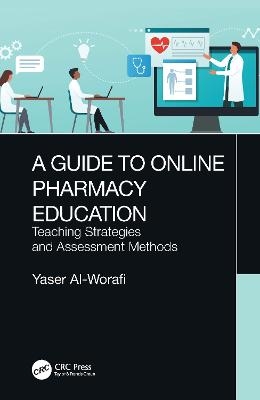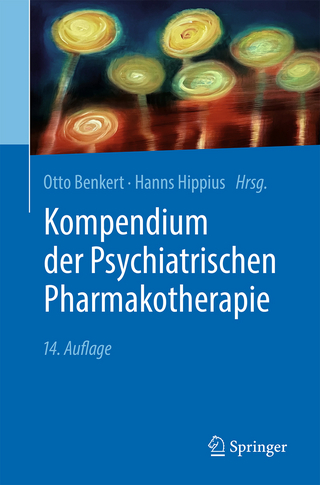
A Guide to Online Pharmacy Education
CRC Press (Verlag)
978-1-032-13692-9 (ISBN)
This book describes in detail the various teaching strategies and assessment methods used in pharmacy education. Included in the text is both the advantages and disadvantages of each teaching and assessment method, as well as tips for effective implementation of the strategies. The text covers a plethora of teaching styles, from web based and online learning to lecture and team-based learning, and highlights some of the best practices used worldwide. This book aims to be a valuable single resource for pharmacy educators, students, and researchers.
Key features
One resource for the pharmacy educators, students, partitioners, researchers, policy makers and other readers with the necessary information and practical guidelines about the online pharmacy education, practice, and research.
Describe and discuss the situation of the online pharmacy education, practice, and research around the world.
Describe the challenges facing the online pharmacy education, practice, and research and suggest recommendations to overcome the challenges.
Describe the pharmacy education teaching strategies and assessment methods.
Describe the advantages and disadvantages of each teaching strategy and assessment method.
Provide tips for the effective implementation of teaching strategies and assessment methods based on the best practices worldwide.
Prof. Yaser Mohammed Al-Worafi is a Professor of Clinical Pharmacy at College of Pharmacy, University of Science and Technology of Fujairah, UAE (Previously known as Ajman University). He graduated with a bachelor's degree in Pharmacy (BPharm) from Sana’a University, Yemen and obtained Master and PhD degree in Clinical Pharmacy from the Universiti Sains Malaysia (USM), Malaysia. He has more than 20 years’ experiences in education, practice and research in Yemen, Saudi Arabia, United Arab Emirates and Malaysia. He has held various academic and professional positions including Deputy Dean for Medical Sciences College; PharmD program director, Head of Clinical Pharmacy/Pharmacy Practice department; Head of Teaching & learning committee, Head of Training committee, head of curriculum committee and other committees. He has authored over 100 peer-reviewed papers in international journals, book chapters and editing more than 10 books by Springer, Elsevier, Taylors & Francis, USA. Prof.Yaser has supervised/co-supervised many PhD, Master, PharmD and B-Pharm students. He is a reviewer for eight recognized international peer-reviewed journals. Prof. Yaser prepared, designed, and wrote many pharmacy programs for many universities including Master of Clinical Pharmacy/Pharmacy Practice program; PharmD program and BPharm program; internship/clerkships for Master, PharmD and BPharm programs; more than 30 courses related to Clinical Pharmacy, Pharmacy Practice, Social Pharmacy and Patients care.
Section 1. Online Pharmacy Education. Chapter 1. Online Pharmacy Education: History and Importance. Chapter 2. Online Pharmacy Education: Degrees, Programs, Certificates, and Advanced Boards Certificates. Chapter 3. Online Pharmacy Education: Curriculum Related Issues. Chapter 4. Online Pharmacy Education: Competencies and Learning Outcomes. Chapter 5. Online Pharmacy Education: Teaching the Theory. Chapter 6. Online Pharmacy Education: Teaching the Practice and Tutorial. Chapter 7. Online Pharmacy Education: Introductory Pharmacy Practice Experiences (IPPE) and Advanced Pharmacy Practice Experiences (APPE). Chapter 8. Online Pharmacy Education: Technologies and Tools. Chapter 9. Online Pharmacy Education: Self-Learning & Self-Directed Learning. Chapter 10. Online Pharmacy Education: Continuous Pharmacy Education and Professional Development for Pharmacy Educators. Chapter 11. Online Pharmacy Education: Community services. Chapter 12. Online Pharmacy Education: Access and Equitable Access. Chapter 13. Online Pharmacy Education: Quality and Accreditation. Chapter 14. Online Pharmacy Education: Advantages and Disadvantages. Section 2. Online Pharmacy Practice. Chapter 15. Online Pharmacy Practice: History and Importance. Chapter 16. Online Pharmacy Practice: Online Pharmacies. Chapter 17. Online Pharmacy Practice: Social-Media, Social-Networking Sites and Webinar & Video Conferencing Platforms. Chapter 18. Online Pharmacy Practice: Mobile Health Technologies. Chapter 19. Online Pharmacy Practice: Medications Safety. Chapter 20. Online Pharmacy Practice: Patient Care. Chapter 21. Online Pharmacy Practice: Continuing Professional Development (CPD) and Lifelong Learning. Chapter 22. Online Pharmacy Practice: Pharmacists Prescribing. Chapter 23. Online Pharmacy Practice: Advantages, Disadvantages and Quality Issues. Section 3. Online Pharmacy Research. Chapter 24. Online Pharmacy Research: History, Importance. Chapter 25. Online Pharmacy Research: Terminologies. Chapter 26. Online Pharmacy Research: Research Method & Methodology. Chapter 27. Online Pharmacy Research: Tips for Implementation. Chapter 28. Online Pharmacy Research: Quality of Online Research. Chapter 29. Online Pharmacy Research: Facilitators and Barriers. Section 4. Pharmacy Education Teaching Strategies. Chapter 30. Pharmacy education: learning styles. Chapter 31. Pharmacy education teaching strategies: traditional and active strategies. Chapter 32. Team Based Learning in pharmacy education. Chapter 33. Problem Based Learning in pharmacy education. Chapter 34. Case Based Learning in pharmacy education. Chapter 35. Simulation in pharmacy education. Chapter 36. Project Based Learning in pharmacy education. Chapter 37. Filliped classes in pharmacy education. Chapter 38. Educational games in pharmacy education. Chapter 39. Web-based learning in pharmacy education. Chapter 40. Lecture based/interactive lecture-based learning in pharmacy education. Chapter 41. Blended learning (BP) in pharmacy education. Chapter 42. Massive Open Online Courses (MOOC) in pharmacy education. Chapter 43. Computer-Assisted Learning (CAL) in pharmacy education. Section 5. Pharmacy Education Assessment and Evaluation methods. Chapter 44. Assessment methods in pharmacy education: strengths and limitations. Chapter 45. Assessment methods in pharmacy education: direct assessment. Chapter 46. Assessment methods in pharmacy education: Indirect assessment. Chapter 47. Assessment methods in pharmacy education: formative assessment. Chapter 48. Objective Structured Clinical Examination (OSCE) in pharmacy education
| Erscheinungsdatum | 26.09.2022 |
|---|---|
| Zusatzinfo | 8 Tables, black and white |
| Verlagsort | London |
| Sprache | englisch |
| Maße | 156 x 234 mm |
| Gewicht | 861 g |
| Themenwelt | Medizin / Pharmazie ► Medizinische Fachgebiete ► Pharmakologie / Pharmakotherapie |
| Medizin / Pharmazie ► Pflege | |
| Medizin / Pharmazie ► Pharmazie ► PTA / PKA | |
| Naturwissenschaften ► Biologie | |
| ISBN-10 | 1-032-13692-8 / 1032136928 |
| ISBN-13 | 978-1-032-13692-9 / 9781032136929 |
| Zustand | Neuware |
| Haben Sie eine Frage zum Produkt? |
aus dem Bereich


